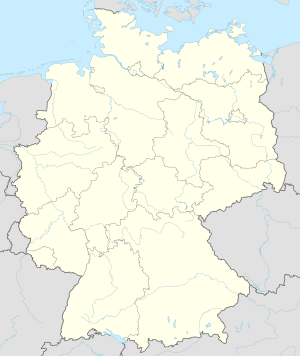Federal Court (Germany)
Federal courts in accordance with Art. 92 Basic Law (GG) dishes in ownership of the covenant by which he parts of the judicial state power perceives that otherwise due to the fundamental attribution of powers to the states only from these (by regional courts is exercised). Therefore, the federal government may only establish those courts that are expressly provided for in the Basic Law.
The following federal courts exist:
| jurisdiction | Constitutional body | judges make |
|---|---|---|
| Constitutional jurisdiction | Federal Constitutional Court (BVerfG) in Karlsruhe ( Art. 93 and Art. 94 GG) | 16 |
| Supreme Court of Justice of the Federation ( Art. 95 GG) | ||
| Ordinary jurisdiction | Federal Court of Justice (BGH) in Karlsruhe (5th criminal senate in Leipzig ) | 135 |
| Labor jurisdiction | Federal Labor Court (BAG) in Erfurt | 40 |
| Financial jurisdiction | Federal Fiscal Court (BFH) in Munich | 59 |
| Social justice | Federal Social Court (BSG) in Kassel | 43 |
| Administrative jurisdiction | Federal Administrative Court (BVerwG) in Leipzig | 55 |
| Other federal courts | ||
| Ordinary jurisdiction | Federal Patent Court (BPatG) in Munich ( Art. 96 Para. 1 GG) | 108 |
|
Military service courts (administrative jurisdiction) |
Troop Service Court North (TDG North) in Münster ( Art. 96 Para. 4 GG) | 6th |
| Troop Service Court South (TDG Süd) in Munich ( Art. 96 Para. 4 GG) | 6th |
Seats of the federal courts Large map: Germany; bottom right: Munich |
The Federal Patent Court formally belongs to the ordinary jurisdiction as the only special court determined by federal law , because it according to Art. 96 para. 3 GG in the instance under the Federal Court is filed.
The federal legislature has so far not made use of the power to set up military criminal courts in the event of a defense, standardized in Article 96 (2) of the Basic Law , or for soldiers sent abroad or on warships; corresponding procedures are assigned to the criminal courts.
Due to the authorization of Article 96, Paragraph 4 of the Basic Law to establish disciplinary jurisdiction against persons who are in a public service relationship with the federal government, there was a federal disciplinary court for disciplinary proceedings against federal civil servants until December 31, 2003 ; these proceedings are now part of the jurisdiction of the administrative courts. Disciplinary proceedings against soldiers are tried in the Troop Service Courts North and South; another troop service court in the middle was dissolved in 1992. In addition, for disciplinary proceedings against judges in federal service, with the exception of judges of the Federal Constitutional Court, there is a federal service court ( Section 61 (1) of the German Judges Act ); this is not an independent federal court, but a special senate of the federal court.
According to the Judges Election Act, the judges of the highest federal courts are elected by the Judges ' Election Committee, which includes the Justice Ministers of the federal states and 16 members elected by the Bundestag. Candidates can be proposed by the Federal Minister of Justice and by the members of the judges' selection committee. Candidates must be German citizens and have reached the age of 35. After a non-binding statement by the Presidential Council of the respective court on the personal and professional suitability of the nominees, the judges' selection committee decides in secret ballot with a majority of the votes cast. The elected are appointed by the Federal President.
In order to maintain the uniformity of the case law, the original version of Article 95.1 of the Basic Law provided for a Supreme Federal Court , which was provided for in Article 96.1 of the Basic Law (the content of which corresponds to today's Article 95.1 of the Basic Law) "Upper federal courts" of the five jurisdictions should be subordinate, but was never established. With effect from June 23, 1968, a constitutional amendment was reacted to, renouncing the Supreme Federal Court and now a joint senate of the highest federal courts (GmS-OGB) in order to preserve the uniformity of the jurisprudence in Art. 95 para. 3 GG Karlsruhe provides.
In addition, although these are courts of the federal states , the higher regional courts in whose district the state governments have their seat exercise ordinary jurisdiction of the federal government by way of organ lending if they are in pursuit of serious political and international law (more precisely: the one in § 120 6, § 142a Courts Constitution Act listed in a catalog ) act ( Art. 96 (5) GG). This has the particular consequence that for convictions by a higher regional court the right to pardon according to Art. 60 Abs. 2 GG lies with the Federal President and not, as usual, with the competent authority of the Land.
See also
Individual evidence
- ↑ Handbook of Justice 2018/2019
- ^ Judges Election Act

